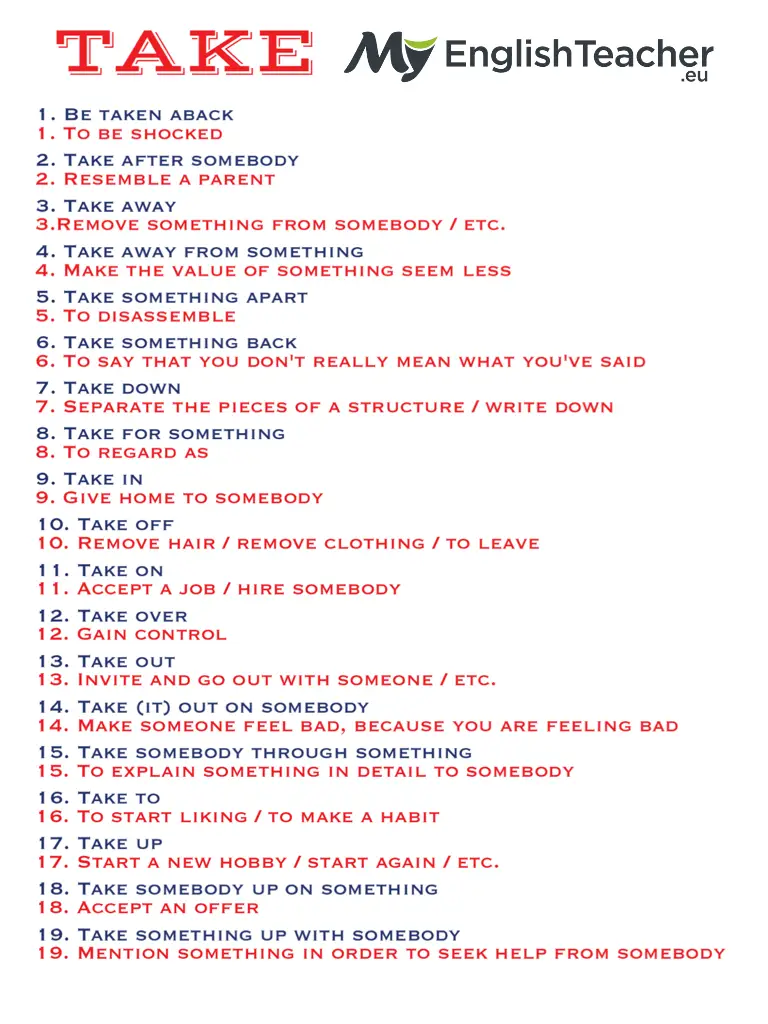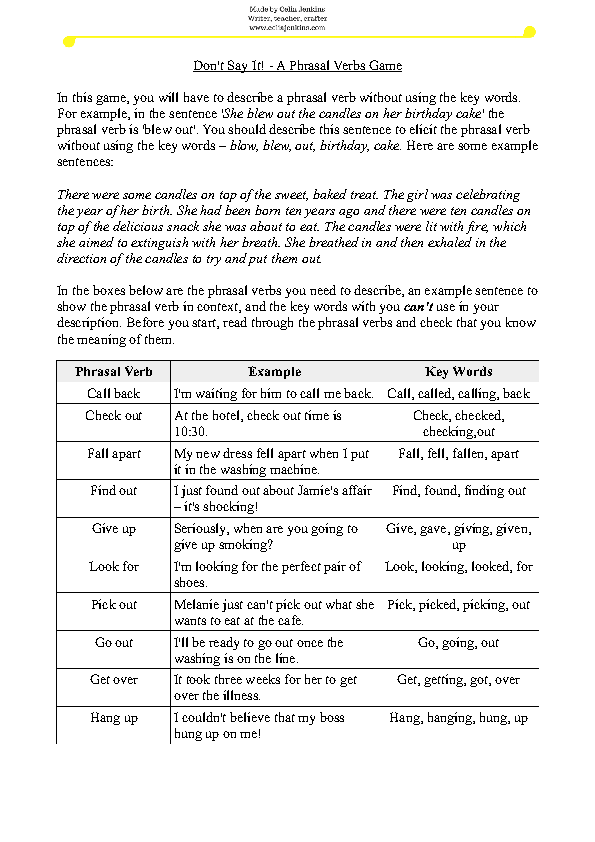Phrasal Verbs In Sentences
But, that is not always the case. Look at the next sentence. I work out of my office. What do you think? In this sentence, work out is not a phrasal verb. Work is a verb, and out is working together with of to form a preposition. You can see from the diagrams that one sentence contains a phrasal verb and one does not. Phrasal verbs A phrasal verb is a verb that is made up of a main verb together with an adverb or a preposition, or both. Typically, their meaning is not obvious from the meanings of the individual words themselves. Intransitive Phrasal Verbs. Intransitive phrasal verbs have no direct object. (A direct object is “acted upon” by the verb). Examples of intransitive phrasal verbs: I woke up at 10:30 AM. You can come over to my house after school. He’s going back to Russia next month. Click here for a list of 15 intransitive phrasal verbs with example sentences. Phrasal verbs list from A to Z in PDF free to download Phrasal verbs from A to Z list free to download in PDF Phrasal verbs are an important part of learning the English language.
Phrasal Verbs In Sentences Pdf
• 'What you can't get out of, get into wholeheartedly.' (Mignon McLaughlin, The Complete Neurotic's Notebook. Castle Books, 1981 • ' Put out the light, and then put out the light.' (William Shakespeare, Othello • 'I never truckled; I never took off the hat to Fashion and held it out for pennies. By God, I told them the truth.'
Examples Of Phrasal Verbs In Sentences
(Frank Norris, Responsibilities of the Novelist, 1902 • 'Clots of excited children egged each other on, egged on their parents, egged on the blue-haired ladies and the teenage lovers and janitor who put down his mop to play.' Cole, Something Incredibly Wonderful Happens: Frank Oppenheimer and the World He Made Up. Houghton Mifflin Harcourt, 2009 • 'Major Major had never played basketball or any other game before, but his great, bobbing height and rapturous enthusiasm helped make up for his innate clumsiness and lack of experience.' (Joseph Heller, Catch-22, 1961). '[P]hrasal verbs with up have filled a wide variety of roles in both British and American English.
Up gets used for literal upward movement ( lift up, stand up) or more figuratively to indicate greater intensity ( stir up, fire up) or completion of an act ( drink up, burn up). It’s particularly handy for blunt calling for resolute action: think of wake up!, grow up!, hurry up! And put up or shut up!' (Ben Zimmer, 'On Language: The Meaning of ‘Man Up.' ' The New York Times Magazine, September 5, 2010).

Phrasal verbs A phrasal verb is a verb that is made up of a main verb together with an or a, or both. Typically, their meaning is not obvious from the meanings of the individual words themselves. For example: She has always looked down on me. Fighting broke out among a group of 40 men. I’ll see to the animals. Don’t put me off, I’m trying to concentrate.
The report spelled out the need for more staff. For instance, in the first example, the phrasal verb ‘to look down on someone’ doesn’t mean that you are looking down from a higher place at someone who is below you; it means that you think that you are better than someone. Transitivity Phrasal verbs can be (i.e. They have no object): We broke up two years ago. They set off early to miss the traffic. He pulled up outside the cottage. They can have an object): The police were called to break up the fight.
When the door is opened, it sets off an alarm. They pulled the house down and redeveloped the site.
Word order The verb and adverb elements which make up intransitive phrasal verbs are never separated: ✓ We broke up two years ago. ✗ We broke two years ago up. The situation is different with transitive verbs, however. If the is a noun, you can say: ✓ They pulled the house down. [direct object] ✓ They pulled down the house.

If the object is a (such as it, him, her, them), then the object always comes between the verb and the adverb: ✓ They pulled it down. [direct object] ✗ They pulled down it. Read more about: Back to.